#jewish book award
Explore tagged Tumblr posts
Text
sometimes you just gotta go insane over unpacking okay
#one of my favourite games of all time#it's fun every time you play#and such casual rep!!!#the mc is a bi jewish disabled woman!!! and you learn this slowly as the game progresses and i’m obsessed#she has roommates who she plays dnd with and they stay friends for years#she learns ukulele#she has an ex boyfriend who is a dick and she stole a bunch of stuff from#her wife got her into a show (I think it's a show) called antihero and they have a whole bunch of merch around their house#she's super active as a kid/young adult but has to stop as she develops what might be chronic pain?#and we see this!!! because she amasses a bunch of pain medication before getting a cane!#her favourite colour is purple#she's an artist!#she creates her own kids book based on the plush that has never left her side since her childhood#and she wins awards for her art!!#unpacking game#unpacking spoilers#wren wrambles
6 notes
·
View notes
Text

Something From Nothing (1989)
Story and Art: Phoebe Gilman
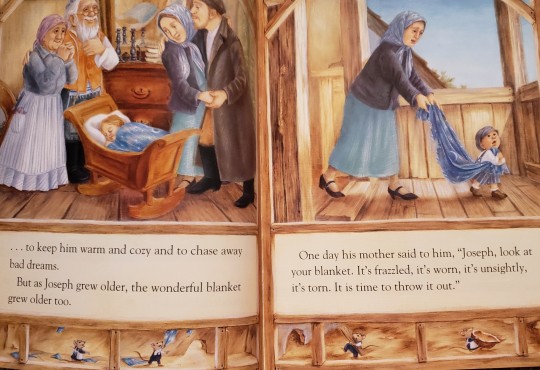
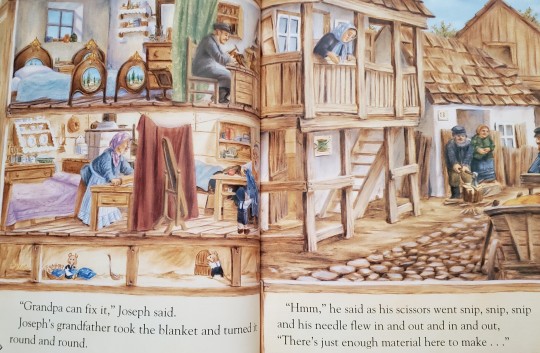


#award winning#something from nothing#phoebe gilman#1980s#80s#yiddish folklore#folklore#jewish#jewish folklore#picture books#kid books#kidlit#children's books#i love books that have extra art in the borders that show a secondary story happening alongside the first#jan brett is great for that too#judaism
21 notes
·
View notes
Text
Daily Book - When the Angels Left the Old Country
When the Angels Left the Old Country Sacha Lamb YA Fantasy / Historical, 2022, 400 pg Jewish agender MC (it/its); Jewish fantasy-disabled mlm male MC Jewish queer female prominent SC Uriel the angel and Little Ash (short for Ashmedai) are the only two supernatural creatures in their shtetl (which is so tiny, it doesn’t have a name other than Shtetl). The angel and the demon have been studying together for centuries, but pogroms and the search for a new life have drawn all the young people from their village to America. When one of those young emigrants goes missing, Uriel and Little Ash set off to find her.

View On WordPress
#Sacha Lamb#when the angels left the old country#angels#award winner#fantasy#historical fiction#lgbtqia#male protagonist#queer books#YA books#daily book#bookblr#Jewish rep#disabled rep#agender#mlm#agender pride day
7 notes
·
View notes
Text

TIME IS RUNNING OUT! The INDIES deadline is JANUARY 15, 2023.
We invite you to submit your book for consideration in our 2022 INDIES book awards competition.
Did you finish your novel in 2022? Was it edited and published? We want you to dream big! Dream about Winning an INDIE Award! You can secure bookstore and library orders, galore! What are you waiting for? Register your book for the INDIES Awards today.
#foreword reviews#indie books#indie publishing#indie author#INDIES#indies awards#indies book awards#authors of tumblr#jewish authors#authors of color#bipoc stories#lgbtq authors#queer author
1 note
·
View note
Text
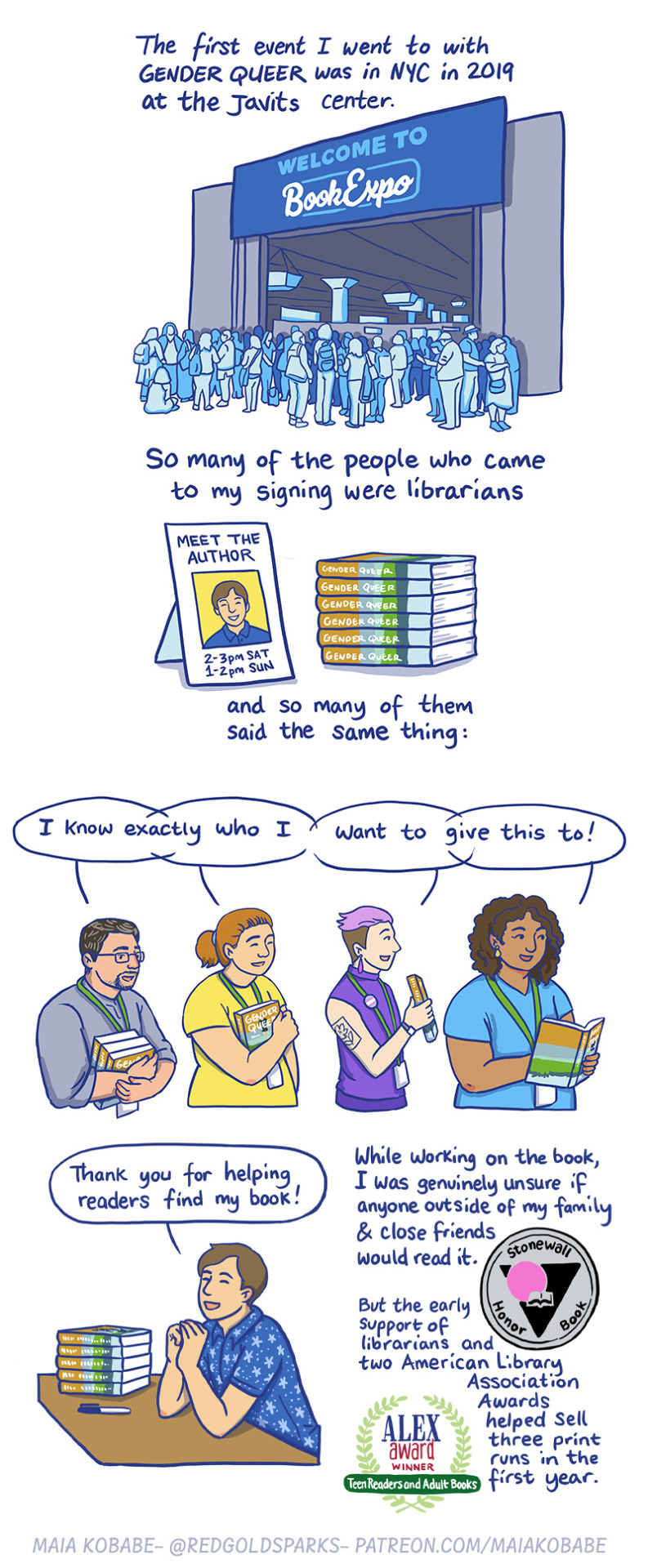
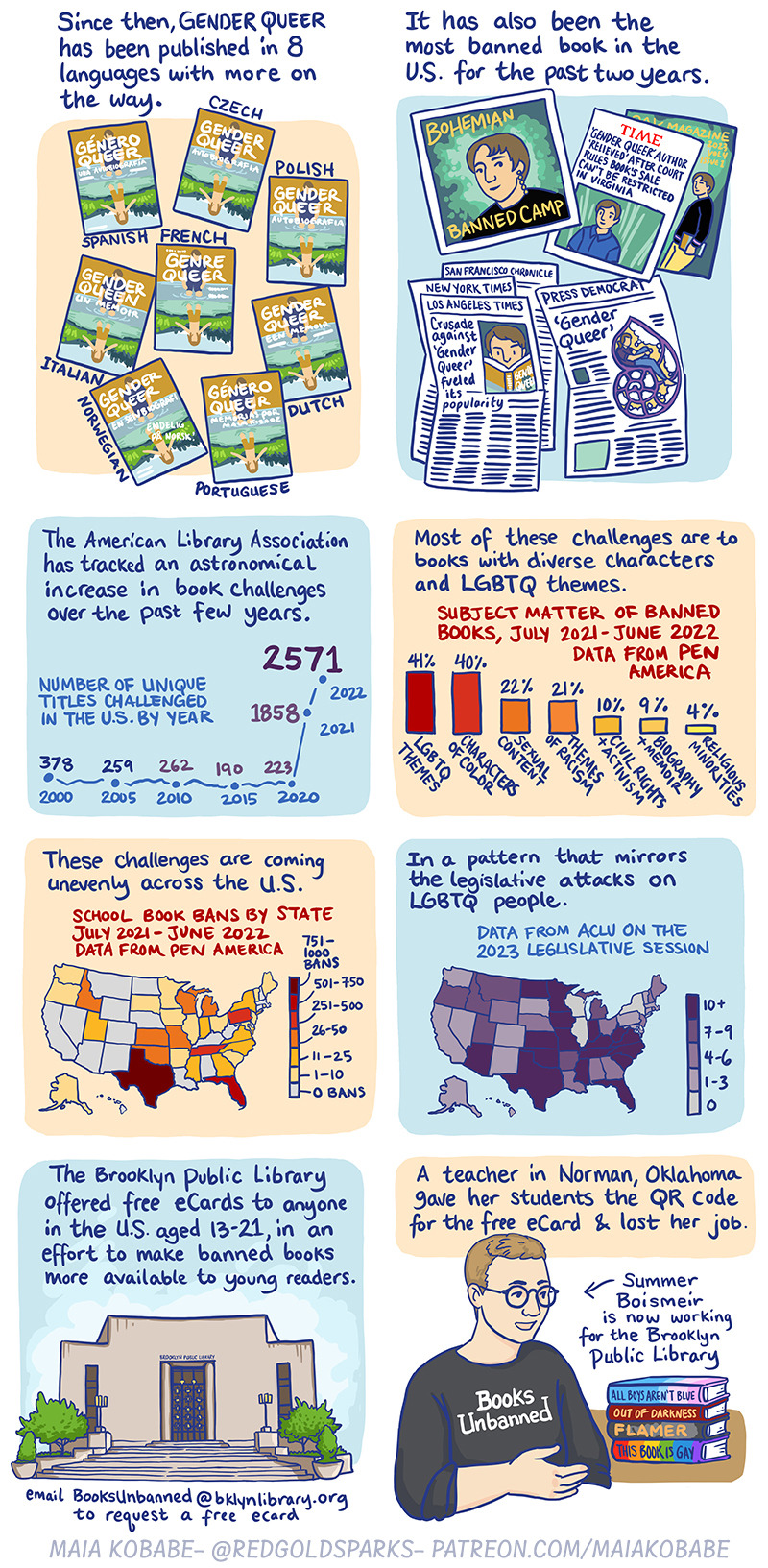
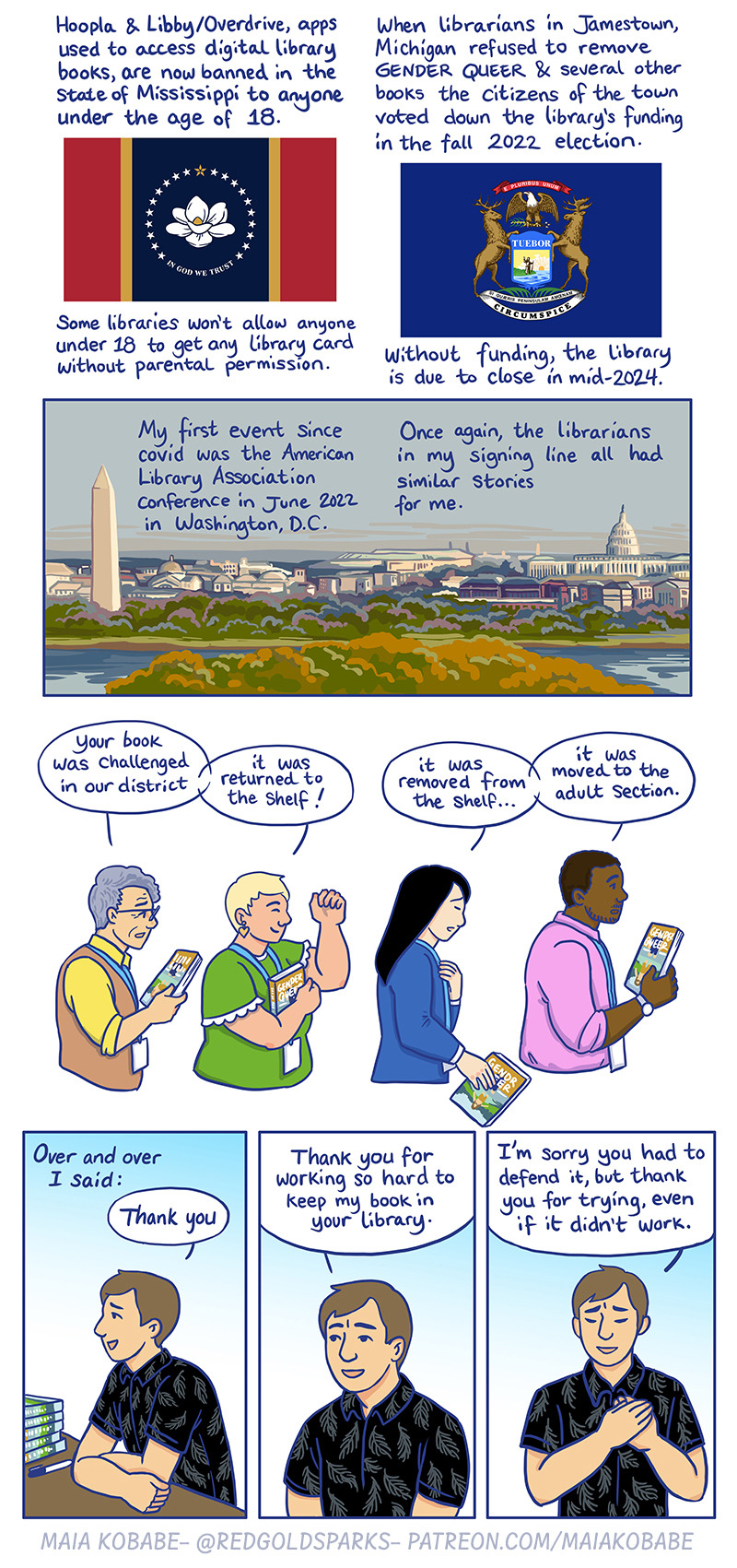
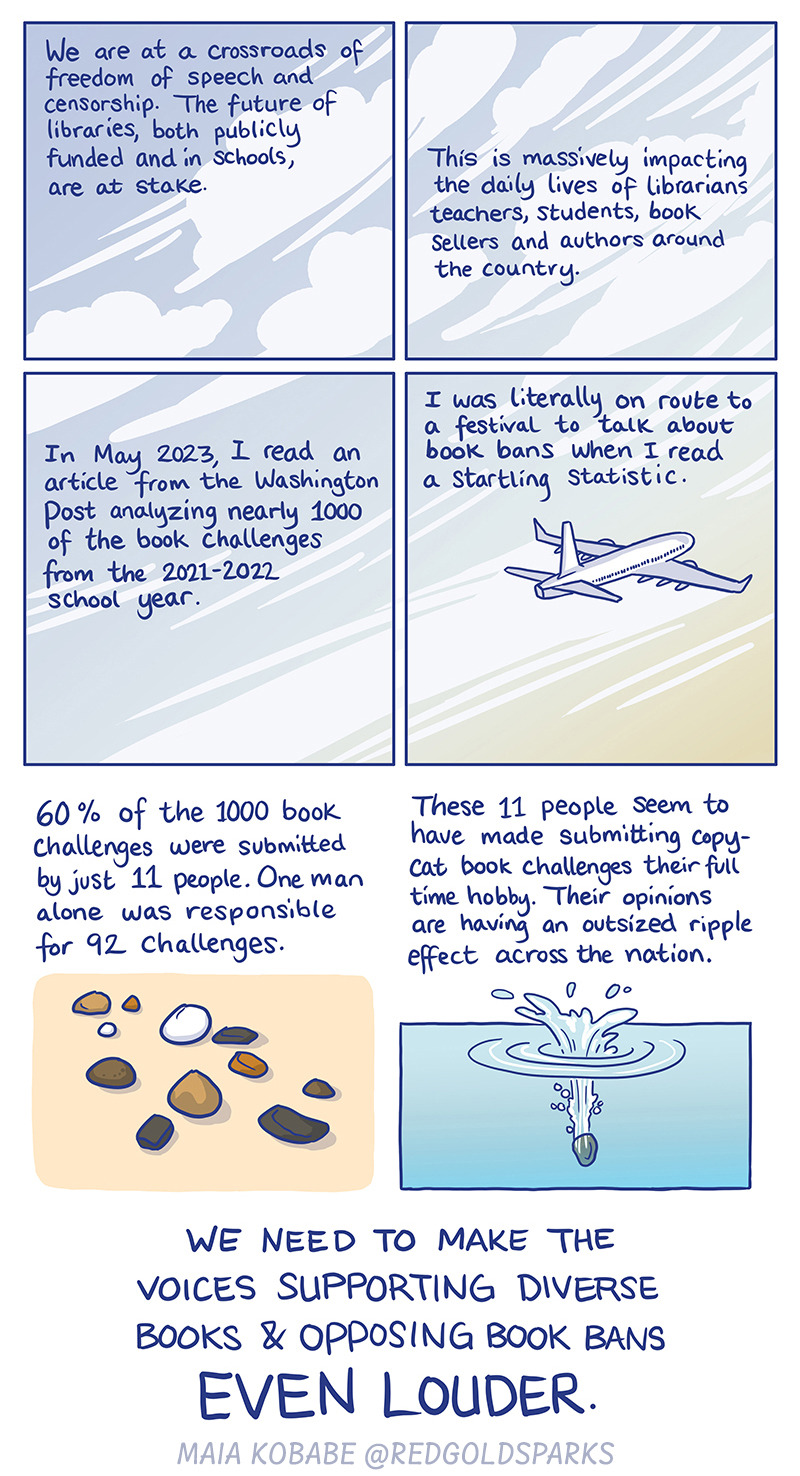
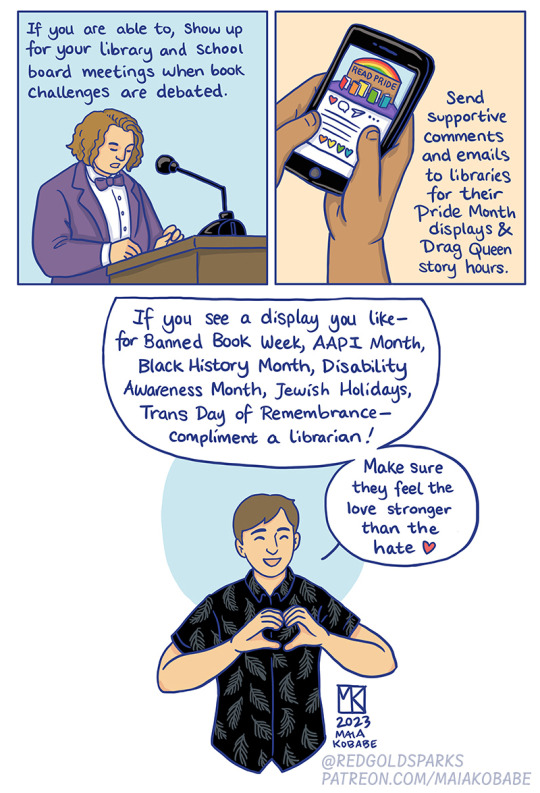
My very last comic for The Nib! End of an era! Transcription below the cut. instagram / patreon / portfolio / etsy / my book / redbubble
The first event I went to with GENDER QUEER was in NYC in 2019 at the Javits Center.
So many of the people who came to my signing were librarians, and so many of them said the same thing: "I know exactly who I want to give this to!" Maia: "Thank you for helping readers find my book!" While working on the book, I was genuinely unsure if anyone outside of my family and close friends would read it. But the early support of librarians and two American Library Association awards helped sell two print runs in first year.
Since then, GENDER QUEER been published in 8 languages, with more on the way: Spanish, Czech, Polish, French, Italian, Norwegian, Portugese and Dutch.
It has also been the most banned book in the United States for the past two years. The American Library Association has tracked an astronomical increase in book challenges over the past few years. Most of these challenges are to books with diverse characters and LGBTQ themes. These challenges are coming unevenly across the US, in a pattern that mirrors the legislative attacks on LGBTQ people. The Brooklyn Public Library offered free eCards to anyone in the US aged 13-21, in an effort to make banned books more available to young readers. A teacher in Norman, Oklahoma gave her students the QR code for the free eCard and lost her job. Summer Boismeir is now working for the Brooklyn Public Library. Hoopla and Libby/Overdrive, apps used to access digital library books, are now banned in Mississippi to anyone under 18. Some libraries won’t allow anyone under 18 to get any kind of library card without parental permission. When librarians in Jamestown, Michigan refused to remove GENDER QUEER and several other books, the citizens of the town voted down the library’s funding in the fall 2022 election. Without funding, the library is due to close in mid-2024. My first event since covid hit was the American Library Association conference in June 2022 in Washington, DC. Once again, the librarians in my signing line all had similar stories for me: “Your book was challenged in our district" "It was returned to the shelf!" "It was removed from the shelf..." "It was moved to the adult section."
Over and over I said: "Thank you. Thank you for working so hard to keep my book in your library. I’m sorry you had to defend it, but thank you for trying, even if it didn't work." We are at a crossroads of freedom of speech and censorship. The future of libraries, both publicly funded and in schools, are at stake. This is massively impacting the daily lives of librarians, teachers, students, booksellers, and authors around the country. In May 2023, I read an article from the Washington Post analyzing nearly 1000 of the book challenges from the 2021-2022 school year. I was literally on route to a festival to talk about book bans when I read a startling statistic. 60% of the 1000 book challenges were submitted by just 11 people. One man alone was responsible for 92 challenges. These 11 people seem to have made submitting copy-cat book challenges their full-time hobby and their opinions are having an outsized ripple effect across the nation. WE NEED TO MAKE THE VOICES SUPPORTING DIVERSE BOOKS AND OPPOSING BOOK BANS EVEN LOUDER. If you are able too, show up for your library and school board meetings when book challenges are debated. Send supportive comments and emails about the Pride book display and Drag Queen story hours. If you see a display you like– for Banned Book Week, AAPI Month, Black History Month, Disability Awareness Month, Jewish holidays, Trans Day of Remembrance– compliment a librarian! Make sure they feel the love stronger than the hate <3
Maia Kobabe, 2023
The Nib
20K notes
·
View notes
Text
OP deactivated, and some of the links were broken/marked unsafe by Firefox, so here's a new compilation post of Leslie Feinburg's (She/her, ze/hir) novels and essays on being transgender:
Stone Butch Blues official free source directly from Author's website:
Stone Butch Blues, backup on the webarchive:
Transgender Liberation: A movement whose time has come, on the web archive:
Transgender Warriors: Making History from Joan of Arc to Dennis Rodman, on the web archive:
Lavender and Red, PDF essay collection:
Drag King Dreams, on the web archive:
(Also, if anyone ever tells you that the protagonist of Stone Butch Blues ""ends up with a man""........ they're transmisogynistic jackass TERFs who are straight up lying)
Please also check out your local public libraries for these books and see if they carry them, to help support public libraries! If you have a library card already you can checkout Libby and Overdrive to see if your public library carries it as an ebook that you can checkout :)
EDIT: another not included on the orignal masterpost-- Trans Liberation: Beyond Pink or blue !
annnnnd in light of the web archive losing it's court case, here's a backup of both PDFs and generated epubs a friend made:
5/26/2023: hello! I am adding on yet another book of queer history, this time the autobiography of Karl Baer, a Jewish, intersex trans man who was born in 1884! Please signal boost this version, and remember to check the notes whenever this crosses your dash for any new updates :)
6/24/2023:
Two links to share!
Someone made an Epub version of Memoirs of a Man's Maiden Years, which you can find Here , as a more accessible version than a pdf of a scanned book if you're like me and need larger text size for reading--
And from another post I reblogged earlier today, I discovered the existence of "TransSisters: the Journal of Transsexual Feminism", which has 10 issues from 1993-1995, and includes multiple interviews with Leslie Feinburg and other queer feminists / activists of the 90s!
Here's a link to all 10 issues of TransSisters, plus a 1996 "look back at" by one of the writers after the journal ended, you can find all 10 issues on the Internet Archive Here !
------
8/28/2023:
"Bi Any Other Name: Bisexual People Speak Out", can be found on the web archive Here, for the 25th Anniversary Edition from 2015,
and also Here, for the original 1991 version.
Each of the above can be borrowed for one hour at a time as long as a copy is available :D
This is a living post that receives sporadic updates on the original, if you are seeing this on your dash, click Here to see the latest version of the post to make sure you're reblogging the most up to date one :)
------------
October, 25th 2023:
"I began to dawdle over breakfast during shift changes, asking both waitresses questions. After weeks of inquiries, they invited me to a demonstration, outside Kleinhan's Music Hall, protesting the Israeli war against Egypt and Syria. I was particularly interested in that protest. The state of Israel had been declared shortly before my birth. In Hebrew school I was taught "Palestine was a land without peo-ple, for a people without a land." That phrase haunted me as a child. I pictured ears with no one in them, and movies projected on screens in empty theaters. When I checked a map of that region of the Middle East in my school geography textbook, it was labeled Palestine, not Israel. Yet when I asked my grandmother who the Palestinians were, she told me there were no such people. The puzzle had been solved for me in my adolescence. I developed a strong friendship with a Lebanese teenager, who explained to me that the Palestinian people had been driven off their land by Zionist settlers, like the Native peoples in the United States. I studied and thought a great deal about all she told me. From that point on I staunchly opposed Zionist ideology and the occupation of Palestine. So I wanted to go to the protest. However, I feared the demonstration, no matter how justified, would be tainted by anti-Semitism. But I was so angered by the actions of the Israeli government and military, that I went to the event to check it out for myself. That evening, I arrived at Kleinhan's before the protest began. Cops in uniforms and plainclothes surrounded the music hall. I waited impatiently for the protesters to arrive. Suddenly, all the media swarmed down the street. I ran after them. Coming over the hill was a long column of people moving toward Kleinhan's. The woman who led the march and spoke to reporters proudly told them she was Jewish! Others held signs and banners aloft that read: "Arab Land for Arab People!" and "Smash Anti-Semitism!" Now those were two slogans I could get behind! I wanted to know who these people were and where they had been all my life! Hours later I followed the group back to their headquarters. Orange banners tacked up on the walls expressed solidarity with the Attica prisoners and the Vietnamese. One banner particularly haunted me. It read: Stop the War Against Black America, which made me realize that it wasn't just distant wars that needed opposing. Yet although I worked with two members of this organization, I felt nervous that night. These people were communists, Marxists! Yet I found it easy to get into discussions with them. I met waitresses, factory workers, secretaries, and truck drivers. And I decided they were some of the most principled people I had ever met..." Transgender Warriors (1996) Leslie Feinberg
#bold text#large text#transgender#trans#nonbinary#leslie feinberg#neopronouns#activism#no id#pride#essays#Karl bae#memoirs of a man's maiden years#bi any other name
13K notes
·
View notes
Text

Why does NASA keep searching for aliens when they're literally right there
Watching Tik Toks that break down how Harry Potter and it's writer (who shall not be named) sucks is so interesting as someone who never consumed any media of the series outside of fan edits.
Because one dude (@/sabregaming) is saying how Hermione is the writer's self insert and basically carries Harry's dumbass on her back because he has no qualities (personality or physically) while another dude (@/daniellesilverstone, who is Jewish) is saying how Hermione is Jewish coded and is written by someone who would have sucked mustache man's dick.
And since I know nothing of this series to disprove it, if both of these creators are correct at the same time, that means this bitch successfully wrote herself into a minority she fucking hates. Holy hell
#where is my anti jkr bingo card?#hitler mention ✅ 'bitch'/'suck a dick' ✅ 'the author meant xyz is a metaphor for abc' (source: trust me dude) ✅#'she who shall not be named' and variations ✅#'harry potter sucks obviously' (book has more literary awards than op has braincells) ✅#op hasn't read the books and only seen tiktok edits (TIK TOK) but thinks her opinion is worth anything ✅#'jkr hates jews it is known!' (actual jkr: denounces the attempt at a cultural boycott of israel and is praised by jewish associations) ✅#op uses words like 'consume media/content' to talk about art and literature and 'content creators' to talk about tiktokers ✅#hp bad takes
48 notes
·
View notes
Text
An incomplete "there's a good chance the icon you love and support is a Zionist" list
🌟 Raphael Lemkin, a Jewish Holocaust survivor, whose family was murdered during it. Lemkin is responsible for coining the term "genocide," and for every legal provision that exists today against it. His work against genocide was inspired by his Zionism.
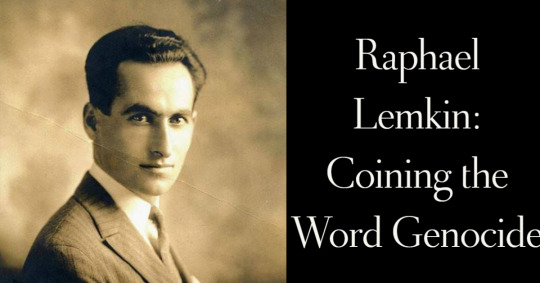
🌟 Martin Luther King, Jr., who did not only support Israel and its right to security, a fellow participant at a dinner with MLK shortly before his assassination quotes him as having stopped a student attacking Zionism, and replied, "When people criticize Zionists, they mean Jews. You’re talking antisemitism." He also encouraged Americans in 1967 to support the Jewish state, as Egypt blockaded the Straits of Tiran, endangering Israeli citizens by cutting the country off from its oil supply.
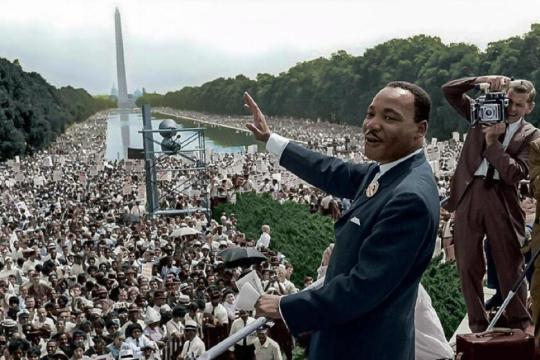
🌟 Emma Lazarus, a Jewish American poet, whose words ("Give me your tired, your poor, your huddled masses yearning to breath free") are engraved on the Statue of Liberty's pedestal, after they helped raise the money needed for its completion. Drawing from the value of Jewish solidarity, she also wrote, "Until we are all free, we are none of us free," adopted as a slogan by intersectionality (while many in the movement exclude Jews from it). She was a great supporter of establishing a state for Jews in the Jewish homeland, having argued for this idea years before the word "Zionist" was even coined.
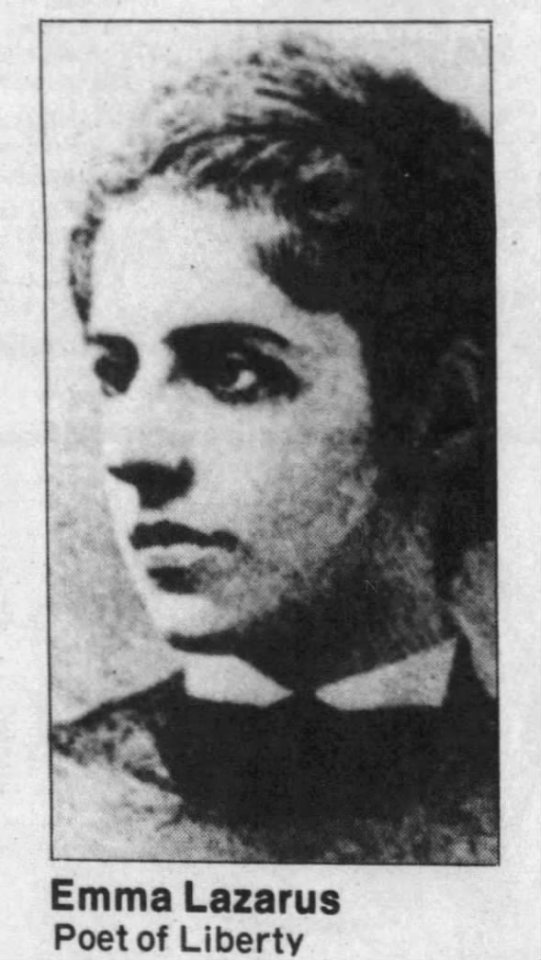
🌟 The 14th Dalai Lama, the leader of the fight against the occupation of Tibet, who was invited in 1994 to Israel, at a time when China's communist regime did its best to prevent his visits anywhere in the world, and who came to Israel more than once, talking about the 2000 years long Zionism of Jewish culture in exile as an inspiration and role model for Tibetans. "Among Tibetan refugees, we are always saying to ourselves that we must learn the Jewish secret to keep our traditions, in some cases under hostile circumstances."
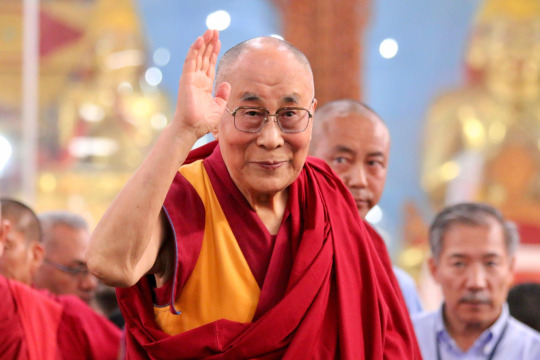
🌟 Ruth Bader Ginsburg, who spoke more than once about how her pursuit of justice is a continuation of that very same thing in Jewish tradition. She had repeatedly referred to American Zionist Jews as sources of inspiration. For example, in 2018, during her fifth visit to Israel, in a speech she gave when receiving the Genesis Award, she mentioned two such women, Emma Lazarus and Henrietta Szold.
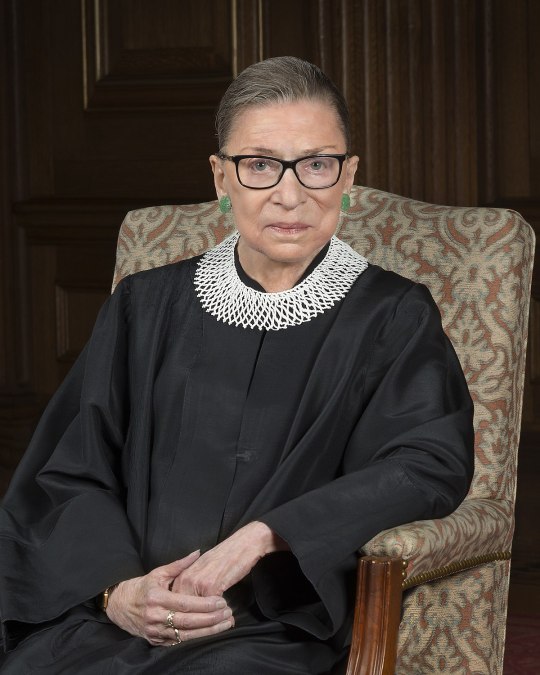
🌟 Nelson Mandela had an ambivalent view of Israel, but repeatedly recognized its right to exist, which makes him a Zionist, he also called upon Arab states to do the same, and was favorable towards the Zionist Jews who supported him during his underground days. Mandela being critical of Israel and still a Zionist is an apt reminder that criticizing the Jewish state and opposing its very existence are NOT the same thing, and only one's antisemitic.
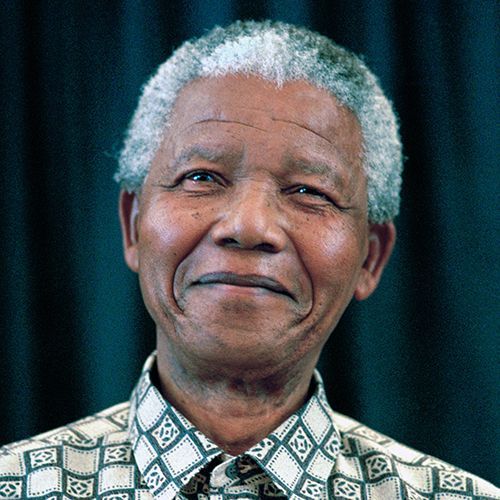
🌟 Felix Salten, the Jewish author of Bambi (the book Disney's movie is based on). The tale was originally a metaphor for Jews suffering antisemitism, something Salten personally had to cope with. He was also an ardent Zionist, feeling the self-liberation at the core of this ideology suited his idea of how to deal with Jew hatred.
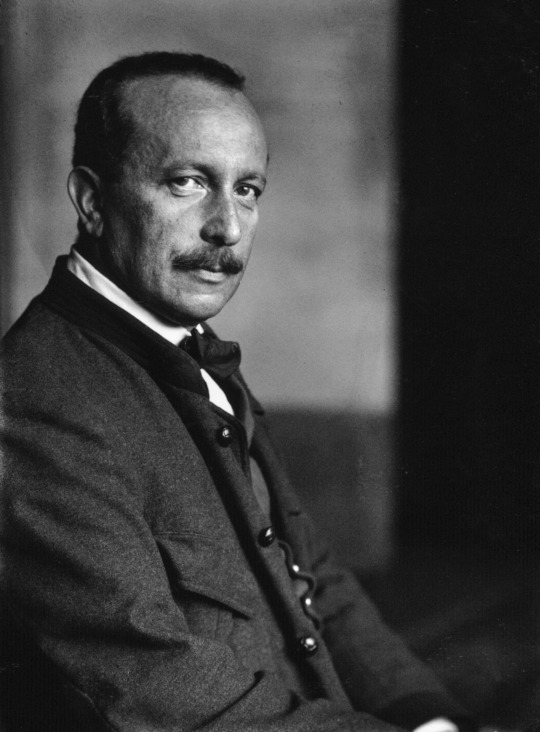
🌟 Sun Yat-Sen, who helped end the rule of China's last imperial dynasty, was its first provisional president, and is nowadays honored as an important Chinese leader in both China and Taiwan (sometimes referred to as "Father of the Chinese Nation"). He was an enthusiastic supporter of Zionism. Among other instances of expressing that, he wrote in a 1920 letter to a leader of the Jewish community in Shang Hai about Zionism that it is, "one of the greatest movements of the present time. All lovers of Democracy cannot help but support wholeheartedly and welcome with enthusiasm the movement to restore your wonderful and historic nation, which has contributed so much to the civilization of the world and which rightfully deserves an honorable place in the family of nations."
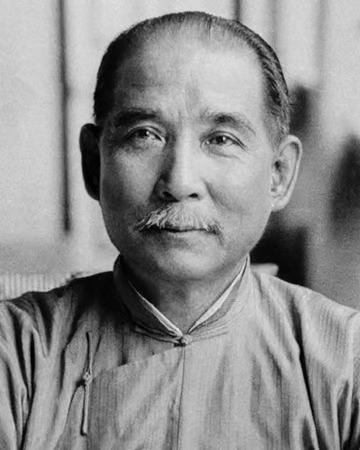
🌟 Magnus Hirschfeld, a gay Jewish sexologist, nicknamed among other things "The Einstein of Sex" and "The Father of Gay Liberation," because his medical and scientific work on human sexuality, as well as social advocacy for women's, gay and trans rights, was nothing short of pioneering. He was persecuted by the Nazis to the point where he died in exile. They broke into his institute of sexual research, where the world's first clinic performing sex reassignments surgeries was located, and burned down the institute's library. Hirschfeld had attended a Zionist conference following the Balfor Declaration of 1917, and his work on sexual liberation found inspiration in young socialist Jewish Zionist workers he met during a visit to the Land of Israel in 1931-2.
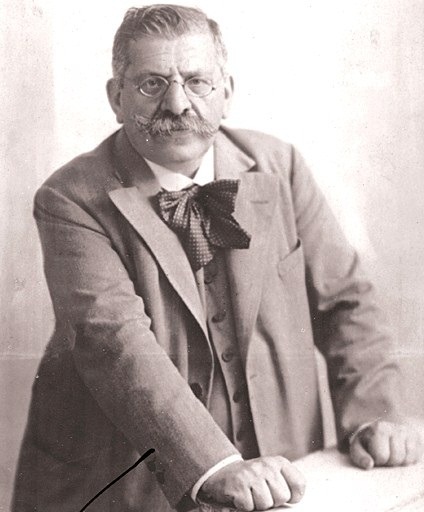
🌟 Marcia Langton, a professor and prominent Aboriginal rights activist from Australia, who has been leading the fight against racism and for her community. She spoke out against the hijacking of native rights movements by terrorist sympathizers and antisemites, and has clearly stood against all loss of life, including that of Israelis.

🌟 Felix Zandman, a Holocaust survivor whose work on resistors is integrated into many smartphones, laptops, cars, satellites, hospital ventilators (saving many Covid patients), airplanes and more. Whenever the anti-Israel crowd is scrolling social media on their phones, they're enjoying the work of a Zionist, who enthusiastically supported the State of Israel, and even introduced an important improvement to the Israeli Merkava tank, which has likely saved many Israeli lives, Jewish and non-Jewish alike, and others like him, since Israel's high tech is considered only second to Silicon Valley (going back to at least the 1990's). If they truly wish to boycott everything that's been "contaminated" by Zionism, they should probably just boycott technology.
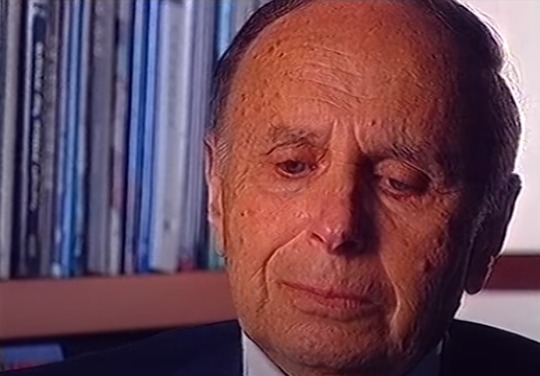
🌟 Rosa Parks, an African American leader of the civil rights movement (and someone who personally demonstrated how one can resist without turning violent). She was one of 200 notable black American leaders who publicly organized to express their support and respect of Zionism as the Jewish right to self-determination, and Israel as the manifestation of that right.
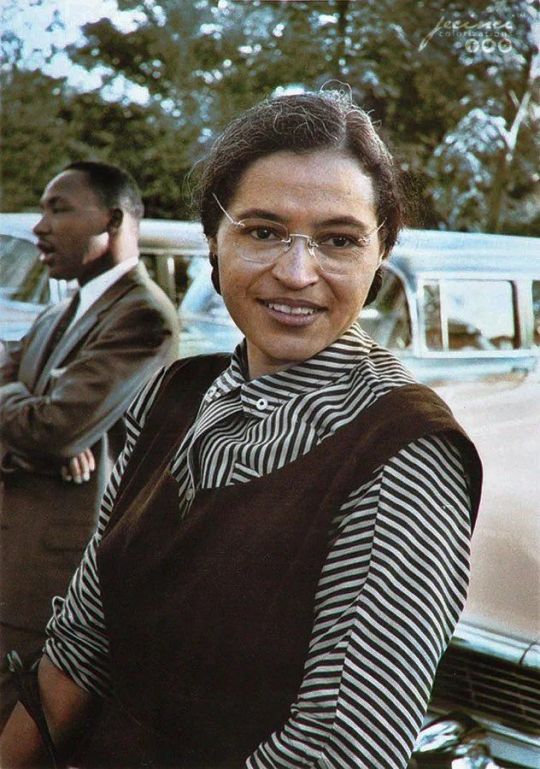
-> Like I said, this is VERY incomplete, even just in terms of how the overwhelming majority of Jews are Zionist, and have been since the inception of Judaism, which is itself Zionist. Over the years, this led to many non-Jewish human and native rights champions to be supportive of Zionism, too. Take note of who is being vilified, when the term "Zionist" is ignorantly used as if it means anything other than belief in the equal right of Jews to liberation and self-determination in the Jewish ancestral land. Especially when it is used as being inherently evil.
(for all of my updates and ask replies regarding Israel, click here)
#israel#israeli#israel news#israel under attack#israel under fire#israelunderattack#terrorism#anti terrorism#antisemitism#hamas#antisemitic#antisemites#jews#jew#judaism#jumblr#frumblr#jewish#resources
795 notes
·
View notes
Text
Here's your daily reminder that...
Jews are only 0.2% of the worlds population but...
Jews make up 14% of the World Total and 38% of the United States of America total winners for the Nobel Prize for Literature (source).
Of the 965 individual recipients of the Nobel Prize and the Nobel Memorial Prize in Economic Sciences between 1901 and 2023, at least 214 have been Jews or people with at least one Jewish parent, representing 22% of all recipients. (source)
Jews make up 14% of the total winners of the Pulitzer Prize for Fiction 18% of the total winners of the Pulitzer Prize for Poetry; 53% of the total winners of the Pulitzer Prize for Non-Fiction (source).
Jews make up 39% of the total winners of the Antoinette Perry (Tony) Award for Best Play; 54% of the total winners of the Tony Award for Best Book of a Musical (with 62% of all Composers and 66% of all Lyricists of Best Musical-winning productions being Jewish) (source).
Jews make up 40% of the total winners of the Academy Award (Oscar) for Best Original Screenplay; and 34% of the total winners of the Academy Award for Best Adapted Screenplay (source).
Although Jews constitute only 3% of the U.S. population...
80% of the nation’s professional comedians are Jewish (source).
90% of American comic book creators are jewish (source)
38% of the recipients of the United States National Medal of Science are Jewish (Source).
Jews are very successful, with educational levels higher than all other U.S. ethnic groups with the exception of Asian Americans, and income levels the highest of all groups. Six out of ten Jewish adults have college degrees, and 41% of Jewish families report a household income of $75,000 or more” (source)
Jews are a minority across the globe. We've been historically opressed and hated. But these key figures from history are all Jewish and loved, yet many don't even know they're jewish (or they don't know these people in the first place!):
Stan Lee (birth name: Stanley Martin Lieber) - An American comic book writer and editor, Former executive vice president and publisher of marvel Comics, creator of iron-man, spider-man, and more.
Albert Einstein - a Theoretical physicist, Received the 1921 Nobel Prize in Physics, developed the theory of relativity and the "worlds most famous equation" (E = mc^2), and more.
Ruth Bader Ginsburg - Former Associate Justice of the Supreme Court of the United States, co-authored the initial law school casebook on sex discrimination, co-founded the Women’s Rights Project at the ACLU in 1972, and more.
Jack Kirby (birth name: Jacob Kurtzberg) - an American comic book artist, co-creator of Captain America, one of the most influential comic book artists
Harry Houdini (birth name: Erich Weisz) - a Hungarian-American escape artist, illusionist, and stunt performer, noted for his escape acts.
Emma Lazarus - An American author remembered for her sonnet "The New Colossus," Inspired by The Statue of Liberty and inscribed on its pedestal as of 1903.
Julius Rosenthal, Lillian Wald, Rabbi Emil G. Hirsch, Stephen Wise, and Henry Moskowitz - Jewish activists that helped form the NAACP along with W.E.B. Dubois, Ida B. Wells-Barnett, and Mary Church Terrell.
Mark Zuckerberg - Founder and CEO of Meta, a businessman who co-founded the social media service Facebook, and within four years became the world’s youngest self-made billionaire Harvard alumni.
Joseph Pulitzer - a politician and newspaper publisher, his endowment to the Columbia University established the Pulitzer Prizes in 1917, he founded the Columbia School of Journalism which opened in 1912.
Jacob William Davis - a Latvian tailor who is credited with inventing modern jeans and who worked with Levi Strauss to patent and mass-produce them, died.
Irving Berlin - drafted at age 30 to write morale-boosting songs for military revues (including “God Bless America”). Many Berlin songs remained popular for decades, including “Puttin’ on the Ritz,” “Cheek to Cheek,” “Anything You Can Do (I Can Do Better),” “There’s No Business Like Show Business,” and two celebrating Christian holidays: “White Christmas” and “Easter Parade.”
Rabbi Abraham Joshua Heschel - received his doctorate in Berlin. He was arrested by the Nazis in 1938, moved to the U.S. in 1940, and became an influential figure in the 1960s, marching with the Rev. Martin Luther King Jr. in Selma, Alabama, and speaking out against the Vietnam War.
Elie Wiesel - Romanian-American writer and professor, holocaust survivor, nobel laureate, political activist. Authored 57 books including Night, a work based on his experiences as a Jewish prisoner in the Auschwitz and Buchenwald concentration camps
Bob Dylan - an icon of folk, rock and protest music, won the Nobel Prize in literature for his complex and poetic lyrics.
J. Robert Oppenheimer - ran the Manhattan Project, considered the "father of the atomic Bomb," presented with the Enrico Fermi Award by President Lyndon Johnson.
Betty Friedan - co-founded the National Organization of Women and became its first president, wrote The Feminine Mystique (1963) and helped spark the second wave of feminism.
Gloria Steinem - one of the most prominent feminists of all time, launched Ms. Magazine and co-founded the National Women’s Political Caucus with Bella Abzug, Shirley Chisholm, Betty Friedan and Myrlie Evers-Williams, widow of Medgar Evers.
Sergey Brin - an American businessman best known for co-founding Google with Larry Page, president of Alphabet Inc.
Judith Heumann - a founder of the disability rights movement, led a 26-day sit-in at a federal building in San Francisco. The protest spurred implementation of Section 504 of the Rehabilitation Act, a precursor to the Americans with Disabilities Act.
Larry Kramer - co-founded Gay Men’s Health Crisis in response to the AIDS epidemic but was soon ousted over his confrontational activism. He went on to help launch a more strident group, ACT UP, and wrote a critically acclaimed play, The Normal Heart, about the early AIDS years in New York City.
Steven Spielberg - released his critically acclaimed epic film Schindler’s List, based on the true story of a German industrialist who saved Jews during the Holocaust. The movie won seven Oscars and led Spielberg to launch the Shoah Foundation at the University of Southern California, which filmed interviews with 52,000 survivors of the Holocaust and genocides in Nanjing and Rwanda.
Calvin Klein - made designer jeans and the infamous ad starring Brooke Shields revolutionized the fashion industry, sold his company to Phillips-Van Heusen (now PVH) for $430 million. Klein was the first designer to win three consecutive Coty Awards for womenswear.
Daveed Diggs - an American actor, rapper, and singer-songwriter. he originated the dual roles of Marquis de Lafayette and Thomas Jefferson in the musical Hamilton, for which he won a 2016 Tony Award for Best Actor in a Featured Role in a Musical. Along with the main cast of Hamilton, he was awarded a Grammy Award for Best Musical Theater Album in the same year.
And so much more. (a pretty decent list is available here)
Not only that, but the following are all Jewish inventions...
The Teddy Bear - made by Morris and Rose Michtom in honor of Theodore "Teddy" Roosevelt.
The Ballpoint Pen - *the first commercially sucessfull ballpoint pen was made by Lazlo Biro, a Hungarian-Jew, and his brother.
Mobile Phones - made by Martin Cooper, nicknamed the "father of the cellphone", and was born in Chicago to Ukrainian Jewish immigrants.
The Barbie - made by Ruth Marianna Handler, born to Polish-Jewish immigrants.
Power Rangers - made by Haim Saban, a Jewish-Egyptian
Video Games - made by Ralph Baer, a German-Jew
Peeps - made by Sam Born, a Russian-Jewish immigrants who came to the United States in 1909.
Cards Against Humanity - created by a group of Jewish boys from the same high school
Many Superheroes including Superman, Ironman, spider-man, batman, and more!
and more! (an illustrated list available here.)
Conclusion: If you're Jewish, be proud. You come from a long line of successful people. No matter what happened to them, Jews persevered, and they strived for sucess. Be proud of your culture, your history, these are your people. You're Jewish.
(feel free to reblog and add more, or just comment and i'll add it!)
Last Updated: June 25, 1:35 AM EST
#funkowrites#jumblr#jewblr#jewish tumblr#israel solidarity#judaism#jewish#antisemitism#stop antisemitism#op is a proud jew#proud to be jewish#jewish joy#jewish positivity#jew#proud jew#we will persevere
563 notes
·
View notes
Text
another thing that's weird about adults who make an identity out of reading children's books is what they hold up as representative of the values they find in YA/young reader's fiction. They typically bring up wish fulfillment fantasy, morals and clear cut lessons, adventure stories with mild peril, strong centering on friendship and found family, and stories that make them "feel good" and are extremely light on genuinely challenging themes or ethically dubious situations.
Meanwhile when I was neck-deep in YA as a kid in the 90s and early 2000s this was the kind of stuff I was reading, other kids were reading, and that was winning awards, being highlighted on shelves and recommended by librarians:
Hatchet by Gary Paulsen, in which a teenage boy survives a plane crash and is stranded in the Canadian wilderness and forced to survive on his own for months. He is ultimately rescued but is permanently altered by the experience. His navigating the drama of (I believe either currently separating or recently divorced) parents is also a major plot element.
Virtual War by Gloria Skurzynski, where real-life wars have been eradicated and instead are fought virtually, (inspired, if I remember correctly, by the disastrous results of a previous nuclear conflict) by specially chosen champions who are trained in combat strategy from childhood. Throughout, the three child champions are forced to question and push back against what the government has told them is the truth as well as against their own prejudices, including toward one of their own who is considered a "mutant" due to his dwarfism; it also details the grueling hours-long "war" in which the kids watch thousands of little 3D soldiers get blown up and dismembered and leaves them feeling genuine guilt for participating in.
Julie of the Wolves by Jean Craighead George, which focuses on a teenage Inuit girl who is orphaned, forced into marriage and sexually assaulted, then runs away and ends up lost in the Arctic and survives by befriending and living with a pack of wolves.
Out of the Dust by Karen Hesse, in which the heroine lives with her parents on a failing farm as the Dust Bowl is beginning, accidentally sets her pregnant mother on fire resulting in her mother's lingering death and the death of her baby, and the girl herself being permanently maimed, after which she and her father become estranged and she eventually tries to run away.
Summer of My German Soldier by Bette Greene, which follows a young Jewish American girl on the WWII homefront who befriends (and falls in love with) a German POW, and when he escapes, hides him in her home for months; eventually the prisoner is caught and killed and the girl is sent to prison after being ostracized from the community and disowned by her parents.
The Ramsey Scallop by Francis Temple, where the heroine, engaged since childhood to her current fiance, is sent on a pilgrimage with him as way of working out his trauma from serving in the crusades. Neither of them feels ready to get married and the fiance is dubious about doing much living at all, but they're able to get to know each other and build trust on the road. It's been ages since I read it but I'm pretty sure there's a scene where a hot single guy who helps patch up an injury she sustained then offers to have sex with her, which she decides to turn down.
Music of the Dolphins by Karen Hesse, where a feral child who has been raised by a pod of dolphins is rescued and taken to a center for rehabilitation. The whole thing follows her progress at understanding to how to be human, and eventually her decision to reject it all and go back to her dolphin family.
The Last Book In the Universe by Rodman Philbrick, whose hero is a teenage orphan living in a purposely abandoned dystopia, ostracized by his community for being epileptic, whose only friends are an old man who is the last literate person in the community and a monosyllabic feral child. The split between the have-nots and the haves, who live in sheltered futuristic cities, and discussion of privilege (one of the main characters is a girl from the cities who comes out to do charity work in the dystopian district) are major themes, and violence is a regular occurrence, including toward the finale when the boy's mentor is murdered by a mob while he watches.
(And of course there's Among the Hidden and its sequels by Margaret Peterson Haddix which I never read, but my sister did, and I know at some point a whole bunch of child characters are massacred by the government because it upset my sister so badly she cried.)
And I couldn't forget The Dear America series, which includes:
character who is finishing high school as the Vietnam War begins and watches her social circle split nastily over the issue, lives through classmates and friends getting drafted, and ends up working at a hospital as volunteer where she is assigned to help disabled veterans
character whose mother (and I think siblings), as well as numerous fellow travelers die while traveling alongside her on the Oregon Trail, and later accidentally poisons to death several of her friends after picking a look-alike plant for their dinner; only one survives, who she eventually marries
character who is kidnapped by a local native tribe and eventually adopted, then marries a fellow captive, only for him and other friends and family to be killed when the tribe is attacked by Europeans, putting her into a total crisis of identity and conflicting loyalties
character who is taken from her tribe to be put in residential school, during which she is forcefully acculturated, severely bullied by another classmate, and a childhood friend of hers is accidentally buried alive
multiple books about immigrants in the 1800 and 1900s which highlighted struggles with poverty, cultural pressures, and prejudice; one of them follows a pro-union factory worker who watches as multiple friends die in the Triangle Shirtwaist fire, and another whose father imports her to America at 13 to marry a coal miner
most of these stories emphasize the young protagonist ending up in situations were they are either on their own, or so alienated from the adults around them that they might as well be. The protagonists have to assume the adult duty of taking care of themselves, but also of thinking for themselves and making their own decisions and judgements about their lives and the world.
they are also going through big changes, often ones created by their parent's decisions, and which they frequently dislike or are straight up Bad for them. This contrasts with later, when the protagonists are able to make decisions for themselves-- often this comes through hardship and abandonment, but ultimately allows them to control their narrative going forward.
the setting and events are often harrowing, deeply unpleasant, and put the protagonist and their friends in danger of victimization by forces around them. Obviously this is exciting for kids to read, but it also allows them to see someone their age on their own, entering into Adult situations and taking on that role. It's also a break from the overtly positive or cartoonishly (but usually un-seriously) bad circumstances that dominate younger kids fiction and an introduction to the idea that life is just terrible most of the time, sometimes massively and unbelievably so. (It's going from the early childhood story of Madeline's thrilling adventures escaping forced labor in a factory, to the older kid's or YA story of seeing the protagonist work at one day after day, getting injured, having friends get sick, and then watching a girl's scalp get ripped off by the machine, something which creates not excitement but genuine horror and sympathy.) These plots also allow adolescents a chance to experience Big Emotions (like the ones they're about to fall head-first into themselves) in a stable, safe way. All of this aims to create a bridge from the juvenile reality to the genuine, adult one. Trite moral lessons are dispensed with in favor of allowing the child to go out and start thinking for themselves. And especially in stories like the Dear America books, it allows a look at things that happened in the past that we have, or should learn from, but also allows for a fuller emotional, ethical, and empathetic development.
often the introduction of sex is part of the story, from initial experiences of attraction (and the resulting self-consciousness, jealousy, etc.) but also sometimes actual sexual experience. Especially in the historical stories, marriage is also frequently part of the story-- either again, as a fantasy introduction to adult experiences, or as a realistic detail separating a child's historical experience from current ones and creating a better understanding of the hardships historical people went through.
and most include some form of rejection of prevailing authority and thought. Instead of blindly "doing what your parents tell you to" these protagonists must do what they think is practical or ethical. The boy in Hatchet cannot wait for an authority figure to guide him, he must figure out how to survive entirely on his own, while the kids in Virtual War are old enough to begin questioning the entire structure they've been raised in, and to develop empathy for figures that structure has deemed outsiders; the heroine of Music of the Dolphins decides the entire experience of being in human society is not for her, and returns to living with animals.
So these books offer harrowing circumstances, protagonists who are isolated literally or through moral or political alignment, and who must learn to live on their own and make decisions for themselves, often in defiance of prevailing attitudes. They usually emphasize finding one's place (even if that place is completely alone and unsupported), fostering understanding and sympathy with others, even with people who are considered "undesirable," who are different, or who have behaved badly to you in the past. And they frequently involve violence, budding sexuality, exploitation and abuse by authority figures/structures, and a heaping helping of death, including the deaths of beloved friends and family members. What is "feel good" and "unchallenging" about that? And like, I can't speak for what YA is bringing to the table now, but these people are overwhelmingly adults, they were reading YA at around the same time I was, I don't think it would be possible for them to have somehow missed the plethora of books with these hallmarks. So where did they get this idea that YA is some land of comfort where no complicated idea can ever reach you? Even Harry Potter is full of them, and we know they read that!
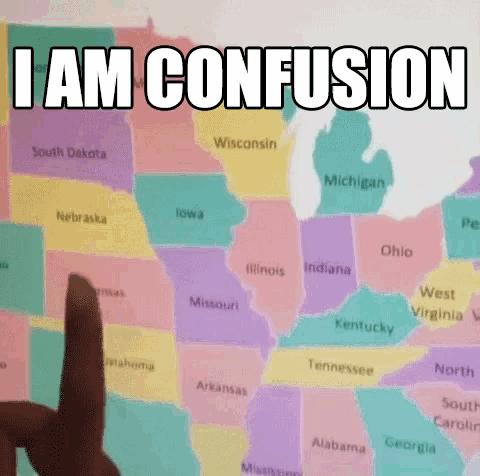
160 notes
·
View notes
Text
I've seen Ta-Nehisi Coates touted as an authority for years, and I honestly never looked into his background.
As he has all the attention of Jumblr and the Jewish community right now, I decided to actually do a cursory look.
Bruh.
Someone who is touted and lauded as a great expert and authority by the Left actually has no credentials whatsoever?! He went to Howard for 5 years and then dropped out to start his journalism career.
Coates states that "Howard trained him intellectually" and just.. no. No it did not.
You didn't finish an undergrad degree my guy. That's barely giving you any training in intellectual thinking and rigor.
It honestly appears that Coates has been given an "authority" pass because he is speaking as a Black Man on Black history and Black issues that currently effect or have effected Black people.
But now?
Now he's taken that "authority" and is using it to speak on issues that he has no relation to beyond traveling to the area for a small amount of time in 2023. He has no understanding, relationship, or education on anything relating to Israel, Palestine, or the Levant. It's reminiscent of Nobel Disease, where an well regard authority in one subject matter starts talking out their ass about something else (e.g. Linus Pauling and vitamin C).
Now, some of you are going to attack me for this because something something privilege and academia and I'm talking about someone who is arguable well regarded. But I'm sorry, dropping out after 5 years to pursue your career, not even have the credentials for said career, and now take that uncredentialed pseudo-expertise and apply it to something you have no relationship to at all?
That's just asinine.
I honestly think this tweet by Montefiore sums it up nicely.
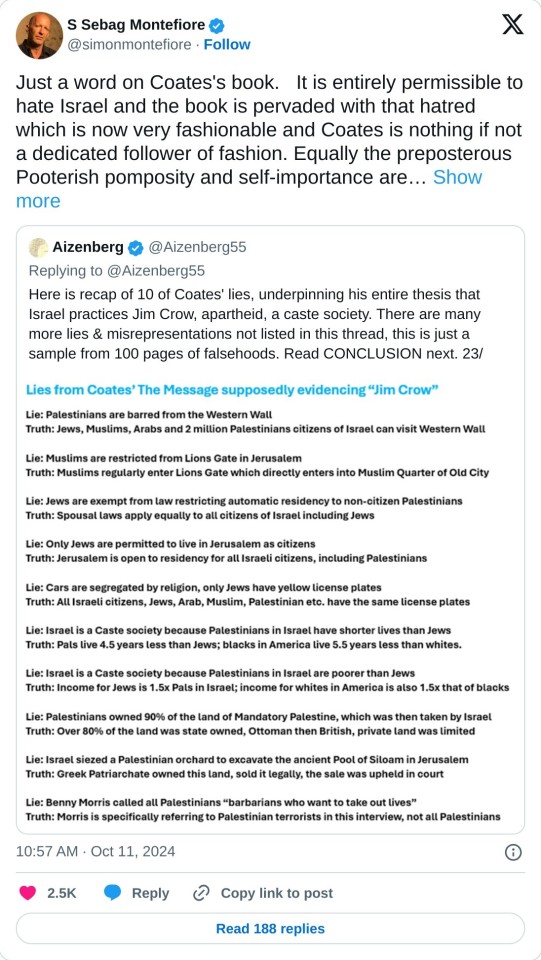
Let's also not forget that Ta Nehisi Coates was taught by his father, Paul Coates, to be antisemitic and literally view this entire situation through America's Issues. Paul Coates was a member of the Black Panthers, which for all the good they did do and have done you also have to remember that antisemitism is baked into the group. The BPP was influenced by the Nation of Islam and Marxism-Leninism and Mao, so they were literally influenced by some of the most antisemitic organizations, groups, people, and rhetoric in the 20th Century outside of Nazis. This means that Ta Nehisi Coates likely grew up with antisemitic rhetoric and conspiracy being prevalent and accepted throughout his life. For example, take this excerpt from his book The Message:

Now also consider that his father's publishing company was also caught republishing an extremely antisemitic book that spreads conspiracy, hate, and misinformation.
So yeah.
Sorry folks.
But Ta Nehisi Coates is just spouting NOI and Tankie antisemitic conspiracy and rhetoric wrapped in progressive pseudo-academic professional language.
#jumblr#antisemitism#leftist antisemitism#pseudo expertise#Intellectual dishonesty#Pseudo academic#ta nehisi coates
221 notes
·
View notes
Text
Qinat Be'eri (A Lamentation for Be'eri) by Yagel Haroush
youtube
Yagel Haroush is a singer, a kamancheh and ney player, a poet, a composer of piyutim (traditional religious songs) and a teacher of Middle Eastern music. After completing his studies at the Jerusalem Academy of Music, Yagel earned a master’s degree in philosophy at Ben-Gurion University of the Negev, and was awarded the Daoud Al-Kuwaiti Scholarship for musical excellence. Yagel specializes in performing and composing music based on maqam, the Middle Eastern modal system. He studied the Persian form of maqam, known as dastgah, with Prof. Piris Eliyahu and his son Mark Eliyahu, and Arab maqam with Prof. Taiseer Elias. As a child, he absorbed the liturgical poetic tradition of the Moroccan piyut (religious song) at his grandfather’s home in the southern Israeli city of Dimona, where every Shabbat, a group of paytanim (composers and singers of piyutim) would gather. Later, he delved into the secrets of the baqashot (“supplications”), a Sephardic mystical singing tradition practiced by Moroccan Jews. Yagel’s ensemble, Shir Yididot, performs original reinterpretations of this tradition that situate the baqashot within the broader context of Middle Eastern mystical song. The group released its debut album in 2016. Yagel is also the founder of the Study Center for Makam and Piyut, where he teaches composition and performance, as well as theoretical performance studies based on Jewish sources – philosophy, Kabbalah and Midrash. He also founded the School of Oriental Music in the Negev in the town of Yeruham, and Kedem, a school for composition in the spirit of maqam in Jerusalem.
Qinat Be’eri was written by Yagel Haroush in the month of Marḥeshban after the massacres on 7 October and disseminated on social media. (The text of the qinah here is as shared on the website Kipa on 7 January 2024.) The initial English translation and notes was shared by Yosef Goldman and Josh Fleet. (These notes were very lightly edited for clarity.) On Tishah b’Av, a second English translation was offered by Dr. Susan Weingarten. –Aharon Varady
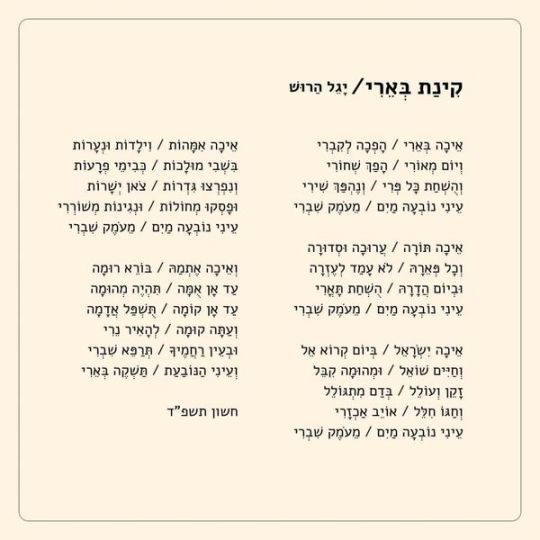
Eikhah [1] – Alas! my well [2] has turned into my grave. And the day of my light [3] has become my darkness And all fruit has been destroyed and my singing overturned. My eyes pour forth water [4] from the depth of my brokenness.
Eikhah — Israel on a day of calling to God. Life was requested but chaos received Elder and infant wallow in blood. [6] His festival desecrated by a merciless enemy. My eyes pour forth water from the depth of my brokenness.
Eikhah — mothers, girls, and young women Taken into captivity as in the days of pogroms And fences were breached righteous sheep And the dancing ceased and the songs of my singers My eyes pour forth water from the depth of my brokenness
And eikhah — I wonder, you who enobled her — How long shall a nation live in upheaval How long shall her stature be brought low to the ground And now, arise to kindle my lamp [7] And from the wellsprings of your mercy heal my brokenness And my eye [8] that pours forth will water Be’eri
The opening word of the Book of Lamentations, “איכה” — translated as “alas!” or “how?!?” — is often used in Jewish poetry of lament — ḳinnot — that memorialize the Jewish people, from the liturgy for mourning the Temple’s destruction to today.
Be’eri means “my well.” [Be’eri here also refers to Kibbutz Be’eri, the site of one of the massacres that took place on 7 October 2023. — ANV]
A reference to the festival of Simḥat Torah on which the massacres took place. In TaNaKh and Rabbinic literature, Torah is compared to both light and water. “For the commandment is a lamp, the teaching of Torah is a light” (Proverbs 6:23) and “A flowing stream, a fountain of wisdom” (Proverbs 18:4). Also find Shir haShirim Rabbah 1:2.
"For these do I weep, my eyes flow with tears; far from me is a comforter who might revive my spirit; my children are forlorn, for the foe has prevailed” (Lamentations 1:16)
i.e. Simḥat Torah.
Find Ezekiel 15:6, “When I passed by you and saw you wallowing in your blood, I said to you: ‘Live despite your blood’…”
It is you who light my lamp; YHVH my elo’ah lights up my darkness” (Psalms 18:29).
Hebrew, עין (‘ayin), means both “spring” and “eye.”
183 notes
·
View notes
Text
Remembering Bayard Rustin: The Unsung Hero of the Civil Rights Movement
written by Levi Wise Kenneth Catoe Jr.
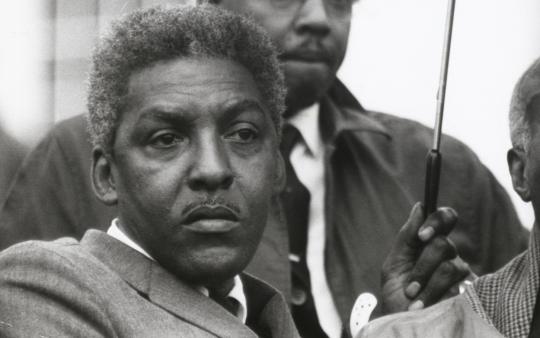
August 1, 2024 - Growing up as a Black boy in Paterson, NJ, and attending Roman and Irish Catholic Parochial schools, Black history was not very familiar to me. I grew up in a religious Southern Baptist family and participated in the church choir. In this context, Martin Luther King, Jr., was all that I knew about Black history until I became a teenage Madonna fanatic. Ironically, Madonna made me aware of Black activists and radicals such as Nina Simone, Jean-Michel Basquiat, James Baldwin, and Bayard Rustin. Bayard Rustin was an African American activist who believed in civil disobedience. Rustin felt that Black people should deliberately break unjust laws but do it non-violently to bring about change and this would play a key role in the Civil Rights movement. He also advocated for LGBTQ rights. Rustin moved to Harlem in 1937 and began studying at City College of New York. It’s interesting to note that at the time CCNY was an all-male college once regarded as ‘Jewish Harvard’ which did not accept Black men—Rustin was an unusual exception. While Rustin was at CCNY he became involved in efforts to defend and free the Scottsboro Boys, nine young black men in Alabama who were accused of raping two white women. Activism for Rustin was something that came naturally. He later became a mentor to Martin Luther King.
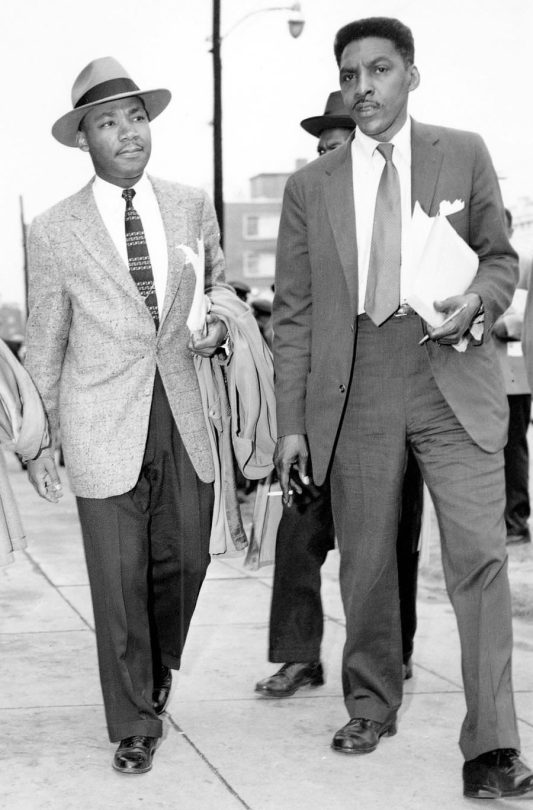
Rustin is one of my all-time idols. I have been enamored of him since I learned about him, so I was excited to attend an event dedicated to his life and legacy at the Schomburg Center for Research in Black Culture, “Between the Lines: Bayard Rustin, A Legacy of Protest and Politics.” The event was a conversation between Michael G. Long and Jafari Allen, who edited the book of the same name. Their exchange sparked many revelations and I left the event more aware than when I entered. I felt so much pity for the life that Rustin had to live, including the attack on his character that was rallied against him by other Black people and the distance that Martin Luther King placed between himself and Rustin out of fear of people assuming that he was also gay. I also learned that it was Coretta Scott King who introduced King to Rustin. Scott-King met Rustin during her college years as a fellow activist who practiced civil disobedience. She would ultimately introduce her husband King to civil disobedience tactics. Rustin recalled that his first time meeting King he was strapped with a handgun and that he never traveled without his gun. It was Rustin who told King that if he represented civil disobedience he would have to be willing to put away his firearm, which eventually he did. Nevertheless, this raises the question, who was King really? The “I Have A Dream” pacifist or the “Beyond Vietnam” radical? We will never truly know.
All in all what I did learn was that according to Rustin, King had no idea how to organize an event. Instead, it was Rustin who developed the blueprint for King’s early Civil Rights movement, at least until the day that King removed Rustin from his inner circle.
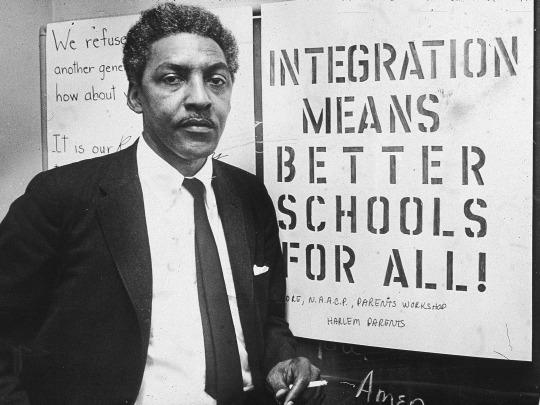
Nevertheless, Rustin returned to organize the March on Washington, despite everything leveled against him by Adam Clayton Powel and Roy Wilkins. Someone noted during the discussion that “it’s funny how karma works given the fact that nobody remembers Wilkins's legacy in comparison to the sudden interest in Rustin.'' If I remember correctly, the comment was made by the moderator, NYU professor Dr. Jarafi Allen, based on the fact that the venue was standing room only, or that the Hollywood lens is now fixated on Rustin’s story, with an Academy Award-nominated movie based upon his life currently in theaters. Wilkins has not received the same interest from Hollywood, perhaps indicating that he is less marketable in the mainstream. Meanwhile, Rustin’s role as an activist for the LGTBQ community is also important for newer generations. Until recently, this legacy and all that he accomplished was invisible, but he has since become a symbol of the “others” and most notably the “forgotten others”. While in his lifetime he was shunned, rallied against, and betrayed by those that he benefitted, history has allowed his legacy the final word.
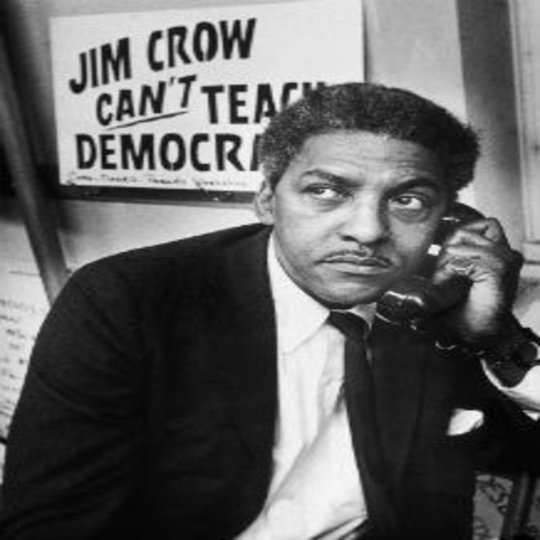
#black literature#black history#black tumblr#critical race theory#black theme#black entrepreneurship#new york
131 notes
·
View notes
Text
Writers from around the globe including Lee Child (creator of Jack Reacher), Bernard Henri-Lévy (Philosopher and Author), Herta Müller (Author, Poet, and Nobel Prize Award Winner), Sir Simon Schama (Historian and Author), Howard Jacobson (Booker Prize-winning Author), Simon Sebag Montefiore (Historian and Author), Adam Gopnik (Writer), Yossi Klein Halevi (Author), David Mamet (Author & Pulitzer Prize Winner), Elfriede Jelinek (Author and Nobel Prize Award Winner), join entertainment leaders, Mayim Bialik, Debra Messing, Julianna Margulies, Scooter Braun, Haim Saban, Ynon Kreiz, Ozzy Osbourne, and Gene Simmons amongst many others, to reject boycotts against authors and literary institutions.
LOS ANGELES (October 30, 2024) — More than 1000 leaders from the literary and entertainment industry signed an open letter released by the non-profit entertainment industry organization Creative Community For Peace (CCFP) in support of freedom of expression and against discriminatory boycotts.
The letter comes in response to continued efforts to boycott, harass, and scapegoat Jewish and Israeli authors and literary institutions. Among the signatories are Nobel laureates, Pulitzer Prize winners, and Booker Prize winners.
Booker Prize-winning author, Howard Jacobson said: “Art is the antithesis to a political party. It is a meeting place not an echo chamber. Art explores, discovers, differs, questions and surprises. Precisely where a door should be forever open, the boycotters slam it closed.”
Recent calls to boycott Israeli literary institutions follow a year filled with efforts to demonize and ostracize Jewish authors across the globe. In the last year, bookstore appearances have been canceled based on authors’ identities and book readings have been shut down. Activists have publicized lists of “Zionist” authors to harass and just last week, ads for a book with ‘Israel’ in the title were rejected.
Author of the Jack Reacher novel series, Lee Child said: “Politically targeting novelists, authors, and publishing houses based on their nationality is misguided. At a time when dialogue is paramount and when compromise can lead to peace, castigation and blanket boycotts are counterproductive. The written word, and the dissemination of it, must always be protected, especially in times of heightened tension. And to achieve peace, we must humanize one another and build bridges across communities through the open exchange of ideas. Literature allows for that. Boycotts hinder it.”
The letter highlights the unique role that writers and books play in society, “We believe that writers, authors, and books — along with the festivals that showcase them — bring people together, transcend boundaries, broaden awareness, open dialogue, and can affect positive change.” It continues, “We believe that anyone who works to subvert this spirit merely adds yet another roadblock to freedom, justice, equality, and peace that we all desperately desire.”
Actress and Author Mayim Bialik said, “Harassing authors, canceling bookstore appearances, and boycotting people based solely on their identity is disturbing and polarizing in ways that cannot be dismissed or minimized. Attempts to dictate “who” or “what” should be published have nothing to do with any path to coexistence or peace. This kind of rhetoric encourages demonization and hatred. As an author and as a creative, I believe in peace, I believe in humanity, and I believe in meaningful discourse. Silencing and sowing discord in this way reduces complex individuals to oversimplified caricatures which only hardens existing hostility and makes the hope for peace inch farther away.”
Philosopher and Author Bernard-Henri Lévy said: “I have always believed in the power of ideas and truth. I have always been in favor of debate, clash of opinions, even the confrontation of convictions. But what we have here is not a clash of opinions or a debate. Boycotting Israeli writers, publishers and festivals is pure anti-Semitism – and it’s anti-democratic and dangerous. The goal of this boycott is the delegitimization of the only Jewish state in the world—Israel. It is a moral obscenity and must be firmly condemned by all free-thinking and democratic citizens of the world.”
Author and historian Simon Sebag Montefiore said: “The resort to witch hunt is always dangerous and ugly especially when the inquisitors are writers. History is full of examples of self-righteous cadres of self-appointed judges who tried to enforce their version of purity by excluding people. Whatever one thinks of this tragic Middle Eastern war, who judges who is good, who bad? Once started where would it stop? Who is pure enough?”
The statement is the first of its kind – a call from the literature and entertainment community to unequivocally voice support against boycott attempts based on identity or litmus test.
The letter states: “Regardless of one’s views on the current conflict, boycotts of creatives and creative institutions simply create more divisiveness and foment further hatred.” The letter concludes: “We call on our friends and colleagues worldwide to join us in expressing their support for Israeli and Jewish publishers, authors, and all book festivals, publishers, and literary agencies that refuse to capitulate to censorship based on identity or litmus tests.”
CCFP Executive Director Ari Ingel said, “Authors, writers, and literary groups have faced non-stop harassment by a dedicated group of illiberal activists since October 7th. This is not just about Israeli authors. This is a coordinated campaign to bully and threaten anyone who refuses to condemn Israel, which targets Jews and their allies worldwide. These boycott calls, now being led by members of the literary community themselves, are reminiscent of the 1933 boycott of Jewish authors, when antisemites burned over 25,000 books. The works of Jewish authors like Albert Einstein and Sigmund Freud, alongside American works by Ernest Hemingway and Helen Keller were burned. This is where things are once again headed.”
Signatories Include:
Howard Jacobson, Booker Prize-winning Author; Lee Child, Author; Mayim Bialik, Actress & Author; Dr. Simon Sebag Montefiore, Historian and Author; Bernard-Henri Lévy, Philosopher and Author; Sir Simon Schama, Historian and Author; Yossi Klein Halevi, Author; Elfriede Jelinek, Playwright, Author and Nobel Prize Award Winner; David Mamet, Author & Pulitzer Prize Winner; Ozzy Osbourne, Artist and Author; Sharon Osbourne, Author, Manager, TV Personality; Herta Müller, Author and Nobel Prize Winner; Dara Horn, Author; Debra Messing, Actress, Gene Simmons, Author & Artist; Julianna Margulies; Actress; Jerry O’Connell, Actor; Douglas Murray, Author; Scooter Braun, Founder/CEO, Hybe America, Ynon Kreiz, Chairman and CEO, Mattel, Inc.; Haim Saban, Chairman and CEO, Saban Capital Group; Aaron Bay-Schuck, CEO/Co-Chairman Warner Records; Sherry Lansing, Former CEO of Paramount Pictures; Rick Rosen, Co-Founder, Endeavor; Jenji Kohan, Writer/Producer; Adam Gopnik, Writer; Deborah Harris, The Deborah Harris Agency; Diane Warren, Songwriter; Anders Rydell, Author; Ilya Kaminsky, Author and Poet; Elisa Albert, Author; Aayan Hirsi Ali, Author; Lionel Shriver, Author; Noreena Hertz Author; Sir Niall Ferguson Milbank Family Senior Fellow at the Hoover Institution and Author; Rebecca De Mornay, Actress; Jennifer Jason Leigh, Actress; Amy Sherman-Palladino, Writer and Producer; Matti Friedman, Author; Neil Blair, Partner, The Blair Partnership; Anthony Julius, Attorney and Author; Gail Simmons, Author; Ben Silverman; Chairman & Co-CEO, Propagate Content; Bret Stephens, Pulitzer Prize Winner; Fernando Szew, President, Fox Entertainment; amongst many others.
54 notes
·
View notes
Text
Lil' musing about Public Domain, AI theft and Transformative creativity
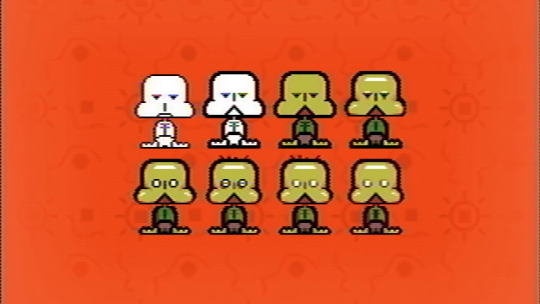
Old essay originally written on Cohost in February 2024. With additions.
I'm putting my thoughts here because I don't want to risk going viral for subtweeting discourse again, here we go! So with the Steamboat Willie Variant of Mickey Mouse going to public domain I've seen the usual cynical pushback over transformative art. Particularly in response to overplayed EDGY DARK WINNIE THE POOH and EDGY DARK STEAMBOAT MICKEY and YOUR CHILDHOOD THING DARK NOW that inevitably happens around this time.
But to group all transformative art as derivative, soul-less, profit-driven, lazy and "reliant on past successes" is frankly just...really silly? I saw a notable concept artist making this over-simplified talking point, and I find it odd that someone can look at the most visible (by being formulaic, provocative and made by rich people) examples of public domain adaptations and just generalize all art ever inspired by a thing as uninventive and compare artists who do that to being "ai-like". It feels like the false dichotomy constantly set between "real books" and fanfiction.
We've seen marginalized people reclaim cosmic horror from Lovecraftian fiction. I've seen queer people reckon with and reclaim the queer history of Peter Pan. There's something special about taking a familiar thing and informing it with a perspective that wasn't present in its original iteration. It takes a whole other part of your creative brain muscles to adapt and reimagine something that already exists. And it can be just as creatively fulfilling as making original stuff.
While it's important to recognize and remember the origin of archetypes in stories or movements in art, I think there's sometimes a misplaced reverence put towards the original version of something. Whenever I talk about how Asian writers like Gene Yang and Sarah Kuhn have more thoroughly integrated Superman's immigrant themes in their re-imaginings of his mythos than their white peers have, I get hit with the constant "hey remember Superman's creators were the sons of Jewish immigrants (who made racist jokes about Chinese people)" and "hey remember, Gene Yang and Gurihiru's Superman Smashes the Klan was based on a radio show arc made by WHITE people first (who made the story about a binary of Good white people vs Bad white people, along with centering how white people feel about racism)".
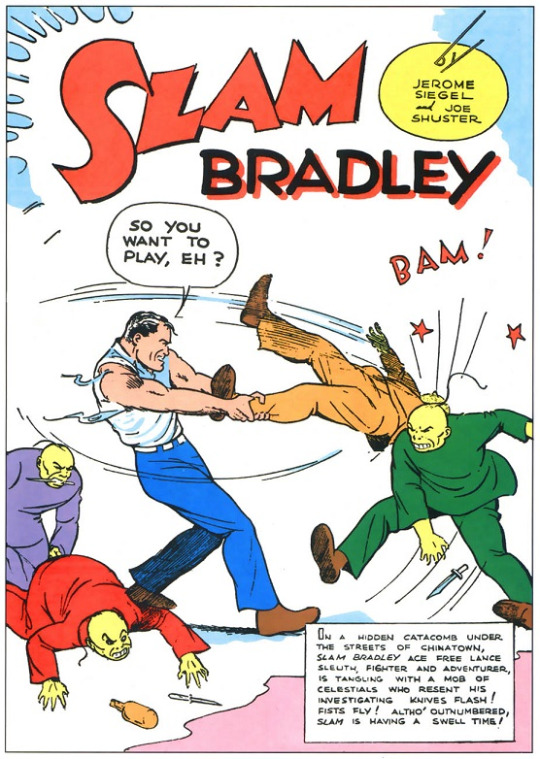

Especially if it's a means of centering white creatives, people love to dismiss the transformative contributions of marginalized people, but especially that of people of color. It took until 2016 for the World Fantasy Award to change their statuette to not be based after the face of renown racist H.P Lovecraft, after all.
Last year I gave myself the goal to do something "unnecessarily ambitious" with no plan of pitching/printing/selling it. Just "art for art's sake", something really not-algorithm-friendly. And yeah, that ended up being a fully rendered, 40-page martian manhunter fan comic. I did it for no other reason than being a huge fan of a severely unpopular character and feeling like there was a new story I really wanted to tell about the character that would never happen in canon with how little there's been written about him. I don't think it's fair to call writing 40 pages of a new origin story, drawing fully colored pages with unique re-designs, reading hours of martian manhunter comics to tie different aspects of his lore into coherent worldbuilding, putting that comic up for free for the few other Green Justice League Guy fans to read, as lazy, profit-driven, and soul-less.
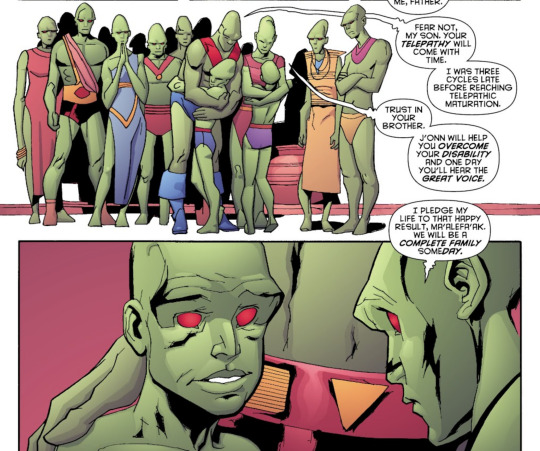
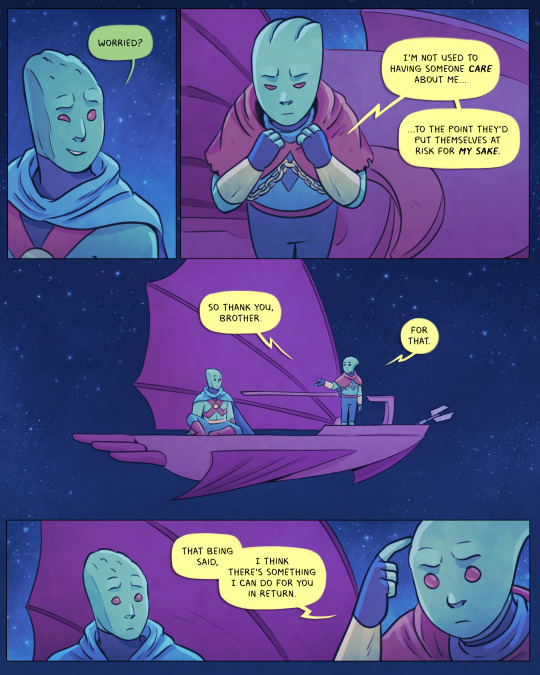
There's tons of artists who do stuff like this all the time. It just comes off as being very out of touch to view true creativity as only existing one way. That transformative media must inherently be "less". One time a white guy pitched to me some ideas he had for Superman if he ever had a chance to write him, and I said "that sounds cool, you should write a fanfic about it" and another white guy (who felt the need to come to the first one's defense), viewed what I said as an insult. There's something about doing fanart because you enjoy it and don't need to profit out of everything you make that's seen as lesser than having the seal of canonicity from a company.
My motto with making needlessly ambitious fancomics is "You don't need to work for DC Comics to make DC comics". Because canonicity has nothing to do with what makes art special.
To bring this back to edgy Mickey Mouse spin offs, even if you do just want to make cliche mascot-horrified stuff because you enjoy it, then by all means go ahead! I always go back to this video Sagan Hawkes did about petscop-inspired video series. There's a running theme about grappling with the concept of Originality in Art in relation to youtube horror projects (the thesis comes around at 2:04:10), and some valuable words are shared in the collected interviews with web series creatives (2:18:47) in the end. SeireaSong (creator behind Diminish) talks about how misguided conversations surrounding "originality" can be (2:29:43). It's so worth it to watch when you have the time.
youtube
Anyway happy 2024! Be good to each other.
#ramblings#media criticism#jesncin cohost essay repost#and a little bit of#jesncin dc meta#me talking about why people view fanfiction and fanart as lesser#there's a video essay recc at the bottom of this#Youtube
60 notes
·
View notes
Note
(This got soo much longer than I meant for it to be omg... sorry about that!!)
American Holocaust by David Stannard is a flawed book with some dated language, but of everything I've read, I think I like its explanation/argument against this weird sort of... competitive genocide stuff. I'm gonna butcher it a little by cutting out a LOT in order to not nuke your inbox with a super long ask, but:
[…] To say this is not to say that the Jewish Holocaust-the inhuman destruction of 6,000,000 people-was not an abominably unique event. It was. So, too, for reasons of its own, was the mass murder of about 1,000,000 Armenians in Turkey a few decades prior to the Holocaust. So, too, was the deliberately caused "terror-famine" in Stalin's Soviet Union in the 1930s, which killed more than 14,000,000 people. So, too, have been each of the genocidal slaughters of many millions more, decades after the Holocaust, in Burundi, Bangladesh, Kampuchea, East Timor, the Brazilian Amazon, and elsewhere. Additionally, within the framework of the Holocaust itself, there were aspects that were unique in the campaign of genocide conducted by the Nazis against Europe's Romani people, which resulted in the mass murder of perhaps 1,500,000 men, women, and children. [...]
Each of these genocides was distinct and unique, for one reason or another, as were (and are) others that go unmentioned here. In one case the sheer numbers of people killed may make it unique. In another case, the percentage of people killed may make it unique. In still a different case, the greatly compressed time period in which the genocide took place may make it unique. In a further case, the greatly extended time period in which the genocide took place may make it unique. No doubt the targeting of a specific group or groups for extermination by a particular nation's official policy may mark a given genocide as unique. So too might another group's being unofficially (but unmistakably) targeted for elimination by the actions of a multinational phalanx bent on total extirpation. Certainly the chilling utilization of technological instruments of destruction, such as gas chambers, and its assembly-line, bureaucratic, systematic methods of destruction makes the Holocaust unique. On the other hand, the savage employment of non-technological instruments of destruction, such as the unleashing of trained and hungry dogs to devour infants, and the burning and crude hacking to death of the inhabitants of entire cities, also makes the Spanish anti-Indian genocide unique.
[…]
A secondary tragedy of all these genocides, moreover, is that partisan representatives among the survivors of particular afflicted groups not uncommonly hold up their peoples' experience as so fundamentally different from the others that not only is scholarly comparison rejected out of hand, but mere cross-referencing or discussion of other genocidal events within the context of their own flatly is prohibited. It is almost as though the preemptive conclusion that one's own group has suffered more than others is something of a horrible award of distinction that will be diminished if the true extent of another group's suffering is acknowledged.
Compounding this secondary tragedy is the fact that such insistence on the incomparability of one's own historical suffering, by means of what Irving Louis Horowitz calls "moral bookkeeping," invariably pits one terribly injured group against another […]
Denial of massive death counts is common--and even readily understandable, if contemptible--among those whose forefathers were the perpetrators of the genocide. Such denials have at least two motives: first, protection of the moral reputations of those people and that country responsible for the genocidal activity (which seems the primary motive of those scholars and politicians who deny that massive genocide campaigns were carried out against American Indians); and second, on occasion, the desire to continue carrying out virulent racist assaults upon those who were the victims of the genocide in question (as seems to be the major purpose of the anti-Semitic so-called historical revisionists who claim that the Jewish Holocaust never happened or that its magnitude has been exaggerated). But for those who have themselves been victims of extermination campaigns to proclaim uniqueness for their experiences only as a way of denying recognition to others who also have suffered massive genocidal brutalities is to play into the hands of the brutalizers. Rather, as Michael Berenbaum has wisely put it, "we should let our sufferings, however incommensurate, unite us in condemnation of inhumanity rather than divide us in a calculus of calamity."
The whole thing is available to read on the Internet Archive if you're interested. (This part starts on pg 149, if you'd just like to have the full context without the parts I chopped.)
Additionally, Carrol Kakel's book The American West and the Nazi East, while imperfect, too, is also very useful in getting at the core issue with these arguments and what makes them harmful--regardless of intent. I'm gonna spare you and not quote too much from this one, but the general gist of what it's about and argues in favor of is summed up like this in its conclusion:
In the case of the Holocaust and its contexts, the new ‘optics’ helps us see that – contrary to the prevailing image of ‘industrial genocide’ – many aspects of the Holocaust are akin to earlier ‘colonial genocide’. It is worth noting (and emphasizing) that the distinction I make between ‘colonial genocide’ and ‘industrial genocide’ is not to suggest some type of crude and arbitrary ‘partitioning’ of the Nazi Holocaust; it is, rather, to suggest and reassert the (settler) colonial roots, content, and context of the Nazi project in the ‘Wild East’ – a content and context linked, in Hitler’s and Himmler’s ‘spatial’ and ‘racial’ fantasies, to the ‘North American precedent’. And finally, the new ‘optics’ also allows us to understand that the ‘genocide and colonialism’ nexus holds the key to recognizing the Holocaust’s origins, content, and context; that the Nazi Holocaust is not a copy – but an extremely radicalized variant – of earlier ‘colonial genocide’; and that ‘holocaust’ is not a separate category from, but the most extreme variant of, the blight on human history we call ‘genocide’.
One of the more infamous examples of someone trying to argue against comparison (at least in the NDN circles I run in, anyway) was Deborah Lipstadt claiming that "[What the United States did to Native Americans] was not the same as the Holocaust" because, she says, "The Native Americans were seen as "competitors" for land and resources. There was, therefore, a certain logic-horrible and immoral as it was-to the campaign against the Native Americans."
Just for context, the full paragraph from her blog post:
What the United States did to Native Americans was horrendous. I have not studied it closely and it's not my area of expertise, however, it seems clear that the treatment of the various Native American tribes was revolting. However, it was not the same as the Holocaust. The Native Americans were seen as "competitors" for land and resources. There was, therefore, a certain logic-horrible and immoral as it was-to the campaign against the Native Americans. [Please note: I am NOT justifying the attacks.] The German campaign against the Jews had no logic and was often completely illogical. People who were "useful" to the Germans were murdered or exiled, e.g. slave laborers in factories producing goods for the Wehrmacht and scientists who were producing important technological advances for the Germans. In a prime example of illogic, in June 1944 at the time of the landing at Normandy, when the Germans were truly on the defensive, they used precious ships and men to go to the Island of Corfu and deport the 1200 Jews who lived there. They ended up in Auschwitz. Approximately 100 of this old Jewish community survived.
This is obviously a repulsive take, but the bizarre rationalization of abject evil isn't what I think makes this such a good example of the big issue at the heart of the constant emphasis on "uniqueness." There are plenty of people who hold these "exceptionalist" beliefs without taking it that much further and dismissing other genocides altogether. No, the thing that makes this such a perfect encapsulation imo is the very first sentence, where this historian, this professor of "Holocaust Studies," this woman who's ostensibly spent most of her entire life studying genocide openly admits she's never really bothered to look into what, exactly, happened to all those Indians way back when.
This is ultimately what I, personally, see as the main issue with this line of thinking. The harm doesn't necessarily come from holding the Holocaust up as "worse" than any other genocidal event, though that way of thinking definitely has its own problems, but from holding it up as fundamentally different.
It's the way this view holds it up as completely separate, in its own little bubble of history where we can study it and analyze it and teach about it all we want... all without ever having to broach the subject of colonialism. You can have entire classes where you study every single minute detail of this one specific genocide without ever having to mention or--god forbid--criticize the system that's driven pretty much every other instance of it.
Deborah Lipstadt has spent the better part of a century learning everything there is to know about the Holocaust, but in all that time, she's apparently never felt the need to look into the events that its perpetrators openly and repeatedly referred to as their inspiration.
This is what makes this sort of framing so dangerous imo. You can spend your entire life educating yourself about genocide, but if it's only in the context of one genocide and the belief in the uniqueness and incomparability of that single event is core to your understanding of both it and your worldview as a whole, you will still be completely incapable of recognizing the signs when it starts to happen again.
this is a really informative ask. thank you so much for sending this in (love the citations haha) i think it adds a lot to the overall discussion.
200 notes
·
View notes